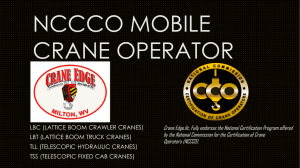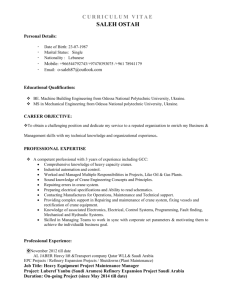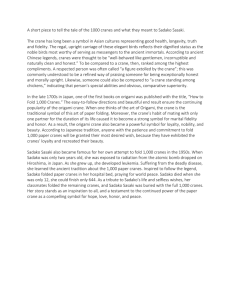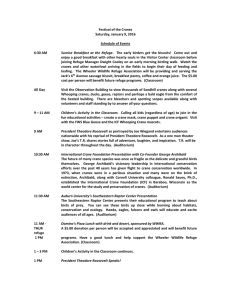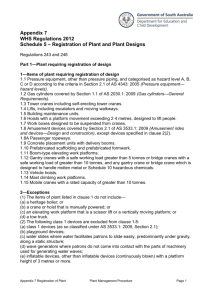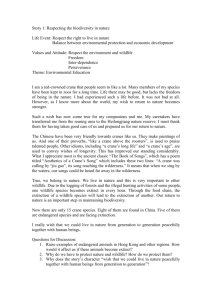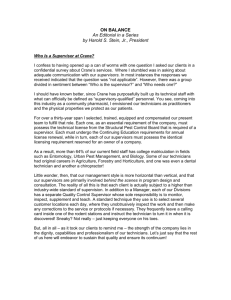HOW TOOL HELPS SOLVE THE PROBLEM: Here's a Checklist you
advertisement
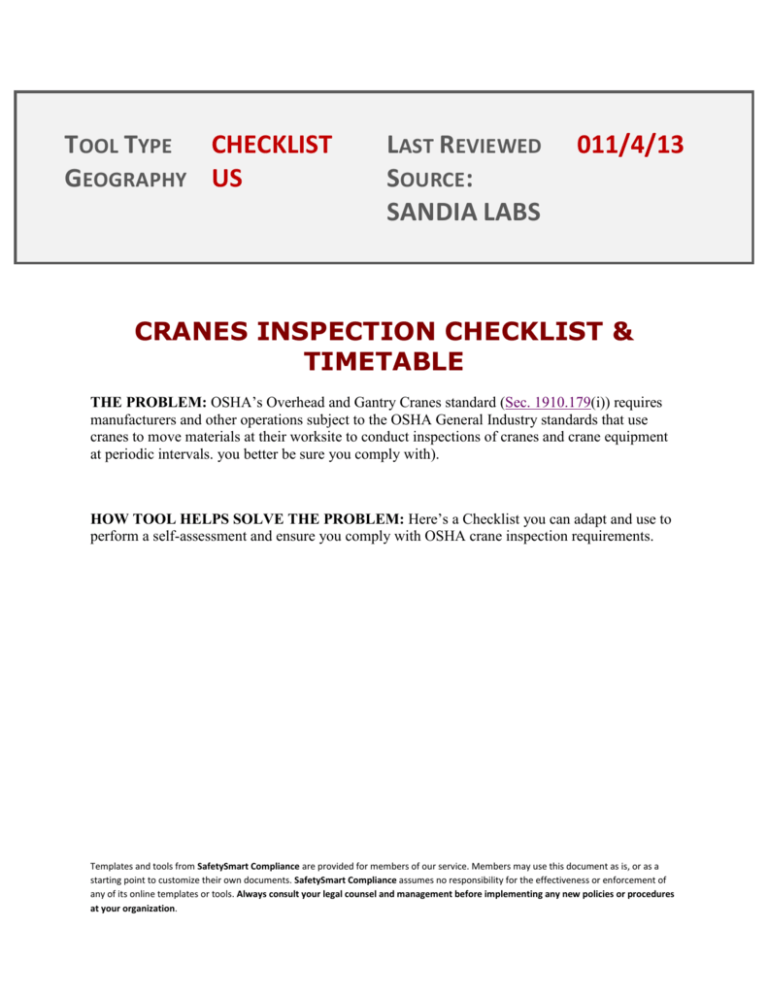
TOOL TYPE CHECKLIST GEOGRAPHY US LAST REVIEWED SOURCE: SANDIA LABS 011/4/13 CRANES INSPECTION CHECKLIST & TIMETABLE THE PROBLEM: OSHA’s Overhead and Gantry Cranes standard (Sec. 1910.179(i)) requires manufacturers and other operations subject to the OSHA General Industry standards that use cranes to move materials at their worksite to conduct inspections of cranes and crane equipment at periodic intervals. you better be sure you comply with). HOW TOOL HELPS SOLVE THE PROBLEM: Here’s a Checklist you can adapt and use to perform a self-assessment and ensure you comply with OSHA crane inspection requirements. Templates and tools from SafetySmart Compliance are provided for members of our service. Members may use this document as is, or as a starting point to customize their own documents. SafetySmart Compliance assumes no responsibility for the effectiveness or enforcement of any of its online templates or tools. Always consult your legal counsel and management before implementing any new policies or procedures at your organization. CRANES INSPECTION CHECKLIST & TIMETABLE INSTRUCTIONS: You should be able to answer YES to each listed measure. For any item to which you answer NO, attach an explanation and a description of any corrective action taken to address the situation. MATERIALS HANDLING SAFETY PROGRAM REVIEW DAILY: TASKS TO COMPLETE EVERY DAY Task Yes No Comment Inspect all functional operating mechanisms of overhead cranes for maladjustment interfering with operations Inspect cranes for deterioration or leakage in lines, tanks, valves, drain pumps and other parts of air or hydraulic systems Visually inspect crane hooks with deformations or cracks Visually inspect hoist chains of cranes, including end connections, for wear, twist, distorted links that interfere with proper function or stretching beyond manufacturer’s recommendation MONTHLY: TASKS TO COMPLETE EVERY MONTH TASK YES NO COMMENTS Completely inspect (beyond visual) hoist chains of cranes, including end connections, Templates and tools from SafetySmart Compliance are provided for members of our service. Members may use this document as is, or as a starting point to customize their own documents. SafetySmart Compliance assumes no responsibility for the effectiveness or enforcement of any of its online templates or tools. Always consult your legal counsel and management before implementing any new policies or procedures at your organization. for wear, twist, distorted links that interfere with proper function or stretching beyond manufacturer’s recommendation and make a written record listing: Date of inspection Signature of inspector Identifier of chain inspected Completely inspect (beyond visual) crane hooks with cracks and deformations, and make a written record listing: Date of inspection Signature of inspector Identifier of hook inspected Inspect crane/derrick ropes and rope reeving for excessive wear and noncompliance with manufacturer’s recommendations , and make a written record listing: Date of inspection Signature of inspector Identifier of ropes inspected MONTHLY: TASKS TO COMPLETE ONLY IF TRIGGERS OCCUR: Have Any of the Following Things Happened in the Past Month: TRIGGER New cranes were introduced to the workplace or significant alterations were made to existing ones YES NO RESPONSE CHECKLIST, IF YES [ ] Conduct initial inspection of new/altered crane before putting it into service [ ] Provide training to affected personnel in new/altered crane Comments: Templates and tools from SafetySmart Compliance are provided for members of our service. Members may use this document as is, or as a starting point to customize their own documents. SafetySmart Compliance assumes no responsibility for the effectiveness or enforcement of any of its online templates or tools. Always consult your legal counsel and management before implementing any new policies or procedures at your organization. A crane that’s been idle for more than 1 month but less than 6 months is to be placed into service [ ] Inspect crane before putting it into service Concerns about current Program expressed by employees, supervisors, safety committee, etc. [ ] Were concerns thoroughly investigated? Comments: [ ] Did investigation find anything to suggest employees are at increased risk? IF YES: Review the adequacy of current: [ ] Hazard assessment [ ] Safe work procedures [ ] Equipment & installations Comments: SEMI-ANNUAL: TASKS TO COMPLETE EVERY 6 MONTHS TASK YES NO COMMENTS Inspect standby crane(s) ANNUAL: TASKS TO COMPLETE AT LEAST EVERY 12 MONTHS TASK YES NO COMMENTS Inspect cranes for loose bolts or rivets Inspect cranes for cracked or worn sheaves and drums Templates and tools from SafetySmart Compliance are provided for members of our service. Members may use this document as is, or as a starting point to customize their own documents. SafetySmart Compliance assumes no responsibility for the effectiveness or enforcement of any of its online templates or tools. Always consult your legal counsel and management before implementing any new policies or procedures at your organization. Inspect cranes for worn, cracked or distorted parts, e.g., pins, bearings, locking/clamping devices Inspect cranes for excessive wear on brake system parts, linings, pawls and ratchets Check load, wind and other crane indicators over their full range for significant inaccuracies Inspect gas, diesel, electric or other powerplants of cranes for improper performance or noncompliance with safety requirements Inspect cranes for excessive wear of drive sprockets and chain stretch Inspect electrical apparatus for pitting or deterioration of controller contactors, limit switches and pushbutton stations Thoroughly inspect alloy steel chain and other slings Templates and tools from SafetySmart Compliance are provided for members of our service. Members may use this document as is, or as a starting point to customize their own documents. SafetySmart Compliance assumes no responsibility for the effectiveness or enforcement of any of its online templates or tools. Always consult your legal counsel and management before implementing any new policies or procedures at your organization.
